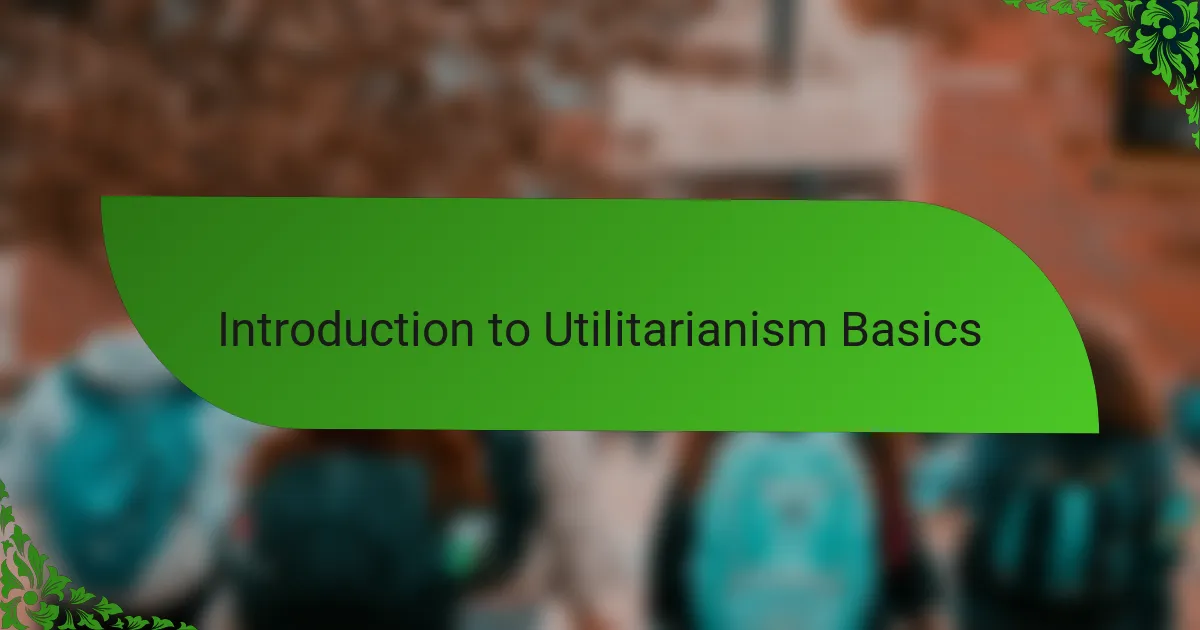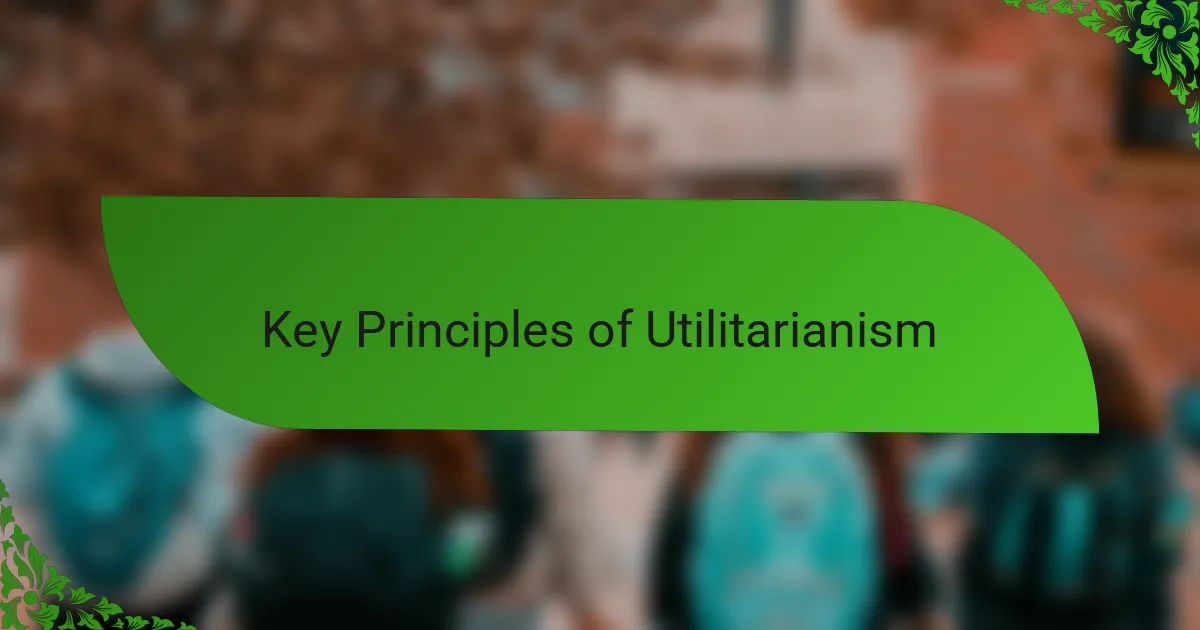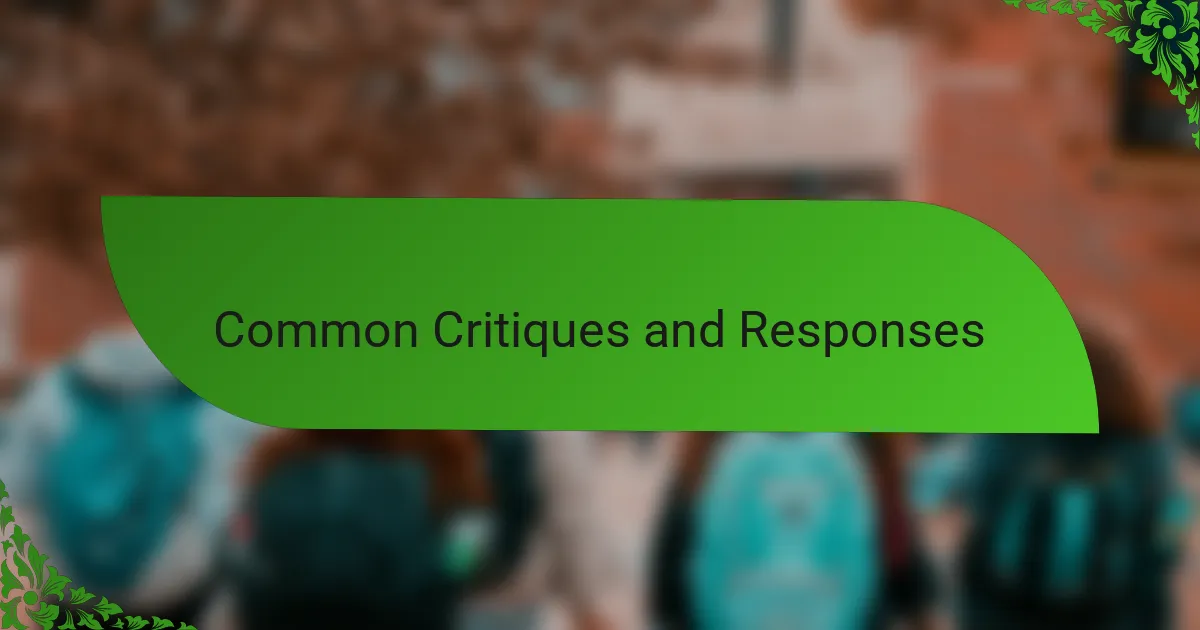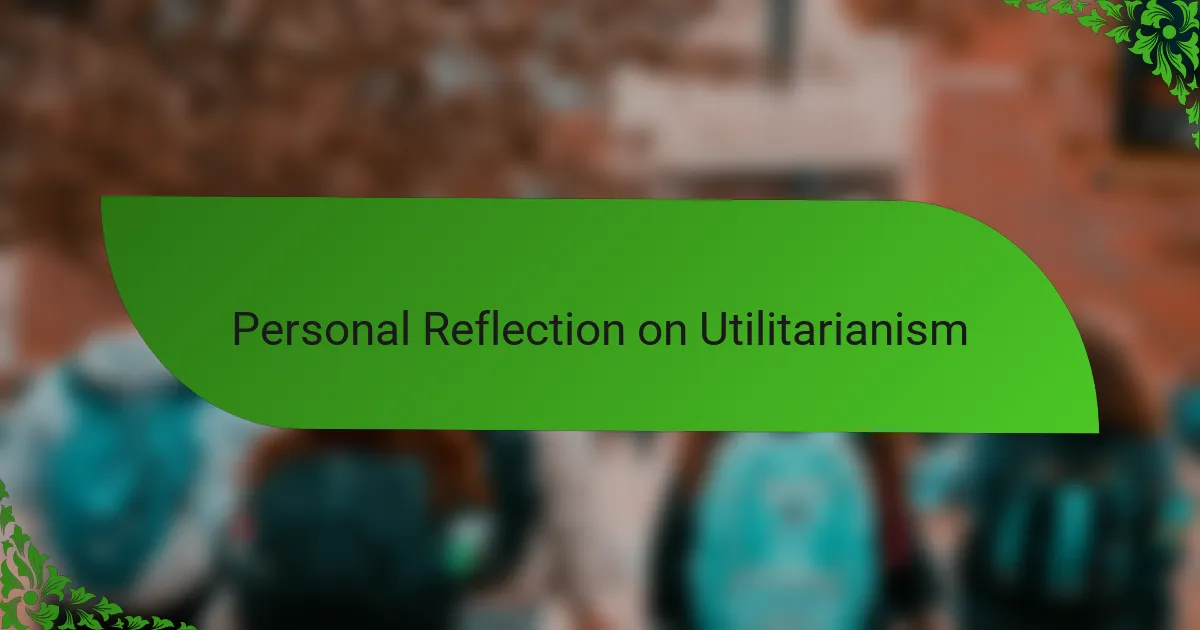Key takeaways
- Utilitarianism focuses on actions that maximize overall happiness, emphasizing outcomes over intentions.
- Peter Singer expands moral consideration to include animals and advocates for effective altruism, encouraging impactful resource use.
- Applying utilitarian principles often challenges personal biases, promoting a broader concern for the welfare of others.
- Common critiques include the difficulty of measuring happiness and the potential to justify morally questionable actions for the greater good.

Introduction to Utilitarianism Basics
Utilitarianism, at its core, asks a simple yet profound question: What action brings the greatest happiness to the greatest number? When I first encountered this idea, it struck me how practical and relatable it felt, almost like a moral calculator for everyday decisions. Don’t we all, at some point, weigh our choices based on who benefits and how much?
What fascinates me about this ethical framework is its focus on outcomes rather than intentions. It’s not about what you mean to do, but the effects your actions produce. Have you ever paused to consider whether your well-meaning decision actually contributes to overall happiness or inadvertently causes harm?
Diving deeper, utilitarianism treats happiness as quantifiable, something we can add up and compare. This approach resonates with me because it challenges us to think beyond personal biases and consider the broader impact. But it also raises tricky questions—how do we fairly measure happiness when it’s so personal and subjective?

Key Principles of Utilitarianism
One key principle of utilitarianism I find compelling is its commitment to impartiality. It asks us to step outside our own shoes and consider everyone’s happiness equally. When I reflect on this, I wonder—how often do we naturally extend such fairness beyond our close circles?
Another core idea is that the right action is the one that maximizes overall well-being, not just individual pleasure. This made me rethink situations where short-term happiness clashed with long-term benefits. Have you ever chosen something that felt good in the moment but later questioned if it truly served the greater good?
Lastly, utilitarianism embraces flexibility, adapting to each unique circumstance rather than relying on fixed rules. This aspect appeals to me because life is rarely black and white—we must weigh consequences carefully. It’s like having a dynamic compass that guides decisions based on what will lead to the best outcome for most people.

Peter Singer’s Approach Explained
Peter Singer’s approach to utilitarianism takes these foundational ideas and pushes them into real-world urgency. What strikes me most is how he expands the circle of moral concern beyond humans to include animals, challenging my own assumptions about who deserves ethical consideration. Have you ever thought about the impact your choices have on creatures other than people?
He emphasizes practical ethics—it’s not just theory for him but a call to action. I remember reading about his arguments for vegetarianism and feeling a mix of discomfort and motivation; it made me question everyday habits I’d never really scrutinized before. Can ethical living be as straightforward as changing what we eat?
Singer also advocates for what he calls “effective altruism,” urging us to use our resources where they can do the most good. This concept resonates with me because it frames generosity as a form of strategy rather than mere goodwill. Doesn’t it feel empowering to think that our efforts can be measured and optimized to save or improve lives?

Applying Utilitarianism in Real Life
Applying utilitarianism in real life often feels like navigating a complex map of consequences. I’ve found that even simple choices—like deciding whether to donate to a charity—become weighty when I ask myself, “Which action will truly maximize overall happiness?” This question pushes me to look beyond immediate feelings and consider long-term impacts, sometimes making decisions that aren’t initially comfortable but feel meaningful.
One example that sticks with me is when I debated adopting a rescue animal versus supporting a wildlife conservation fund. Both choices aim to reduce suffering, but looking through a utilitarian lens meant assessing which would produce greater good overall. This kind of thinking requires honesty and sometimes sacrifice, yet it also brings a sense of purpose to everyday actions.
Have you noticed how utilitarianism can challenge our instinct to prioritize close relationships over strangers? It has certainly made me pause and reassess how I allocate my time and resources. This framework nudges us to expand our circle of concern, which I believe, in turn, cultivates a deeper empathy and a more thoughtful approach to ethical living.

Common Critiques and Responses
One common critique I’ve come across is that utilitarianism’s focus on the greatest happiness can sometimes justify actions that feel morally wrong, like sacrificing an individual for the majority’s benefit. This always struck me as uncomfortable because it challenges my intuition about fairness and justice. But then I remind myself that Peter Singer encourages us to consider the broader consequences carefully—sometimes tough choices are necessary to prevent greater harm.
Another critique targets the difficulty of measuring happiness or well-being objectively. I often wonder, how can we truly compare one person’s joy against another’s pain? From my experience, Singer doesn’t ignore this problem; instead, he invites us to use reasoned estimates and evidence to guide our decisions, knowing perfection is impossible but striving for better outcomes anyway.
Some people argue utilitarianism demands too much—it asks us to prioritize strangers over ourselves constantly, which feels overwhelming. I used to feel that weight too, questioning if it meant neglecting my loved ones. But reflecting on Singer’s effective altruism approach helped me see it differently: it’s not about giving everything away but making deliberate, impactful choices that balance personal obligations with global concern.

Personal Reflection on Utilitarianism
When I reflect on utilitarianism personally, I’m struck by how it challenges my natural inclinations toward partiality. It’s not easy to sit with the idea that my actions should weigh the happiness of strangers as heavily as that of my family or friends. Have you ever felt that tug between personal loyalty and the idea of greater good? It’s a tension that made me reconsider what fairness truly means.
At times, I’ve found utilitarianism both inspiring and unsettling. The thought that my everyday choices—what I buy, how I spend my time—could have ripple effects on countless lives is empowering but also a bit daunting. I remember feeling overwhelmed when I first tried to apply Peter Singer’s call for effective altruism; it made me ask, “Am I doing enough?” That question, while uncomfortable, pushed me toward more mindful decisions.
Yet, despite the challenges, utilitarianism has deepened my sense of responsibility. It’s like holding a mirror up to my actions and asking if they really contribute to a better world. This ongoing reflection doesn’t always provide clear answers, but it keeps me engaged in trying to make ethics practical and personal—and that feels meaningful to me.

Using Utilitarianism in Ethical Decisions
When I apply utilitarianism to ethical decisions, I ask myself: Which choice will lead to the greatest overall happiness? This question often feels deceptively simple but forces me to look beyond my immediate desires and consider a wider impact. It’s tricky, though—sometimes the option that benefits the most people isn’t the most comfortable or popular at first glance.
I remember facing a tough decision about allocating resources at work. Choosing to support a program that helped many underserved people rather than one benefiting a smaller, familiar group made me uneasy initially. Yet, when I focused on the bigger picture—the aggregate well-being—the utilitarian lens guided me to act in a way that I now believe was truly ethical, even if it felt personally challenging.
Have you ever struggled with balancing your own preferences against what benefits others most? From my experience, using utilitarianism helps by offering a clear, outcome-based yardstick, though it demands honesty and reflection—qualities I think deepen our moral awareness rather than simplify it.